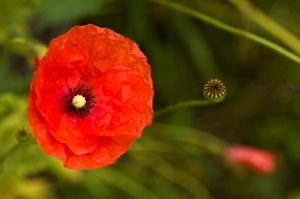The Royal Botanic Garden Edinburgh (RBGE) will mark the centenary of the start of the First World War by creating a poppy field at the centre of its Edinburgh site. The display will commemorate the employees who went to war, many of whom lost their lives, and will also remember others who were, or still are, affected by war.
Commenting, RBGE’s Regius Keeper Simon Milne MBE says: “Plant symbolism is an important part of cultures across the globe, particularly through representing emotions and spirituality. It is therefore fitting that at the Royal Botanic Garden Edinburgh, the heart of Scotland’s plant heritage, we mark the anniversary of the start of World War One with a poppy field. I hope that the flowers will encourage people to reflect on the 16 million people who lost their lives and the impact that the war had on the lives of everyone.”
The poppy field, located on the Garden’s prominently-positioned Glasshouse Lawn, will be sown in May using the common poppy Papaver rhoeas, an iconic symbol of remembrance and used to commemorate the Great War since 1921. This large, four-petalled, scarlet flower can lie dormant for many years before germination which is often triggered when the soil is disturbed.
During the First World War, battlefields that were blasted and bombed created ideal conditions for it to flourish. The sight of poppies, appearing to heal the torn earth, inspired Canadian Lieutenant Colonel John McCrae to write the memorable war poem In Flanders Fields.
RBGE’s horticultural team is planning for swathes of poppies to emerge in late July, in time to mark the centenary. David Knott, Curator of the Living Collection, explained: “We did trials with the poppy in our nursery last year in order to try and get the timing of flowering just right to coincide with the start of the commemorations. Once the poppies are planted, we are pretty much in the hands of the weather as to the result but we all hoping our efforts will make a fitting and timely tribute.”
At the time of the Great War, the Garden had 110 staff and of the 88 men, 73 joined the forces and 20 lost their lives in action. Click here for further information about RBGE during the First World War.
